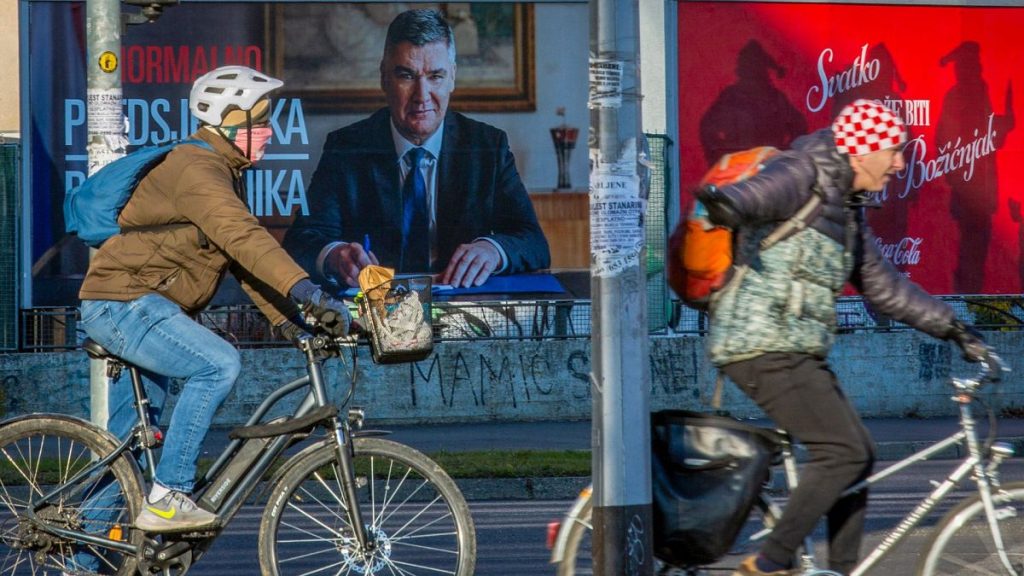Zoran Milanović’s Controversial Reelection Bid: A Balancing Act for Croatian Democracy
Croatia’s presidential election this weekend pits incumbent Zoran Milanović, a left-leaning populist, against a diverse field of contenders. Milanović, despite his popularity, faces criticism for his contrarian stances, most notably his opposition to Western support for Ukraine. While his reelection is not assured, requiring a potential runoff if no candidate secures over 50% of the vote, his continued presence in Croatian politics poses both opportunities and challenges for the nation’s democratic trajectory. His unique blend of populism and left-leaning ideology, coupled with his vocal criticism of the ruling HDZ party, creates a complex political landscape in a nation navigating its relatively recent entry into the EU and its evolving role within the Western alliance.
Milanović’s presidency has been marked by a distinctive populist approach, attracting support while simultaneously generating controversy. He has challenged the prevailing narrative on Ukraine, advocating for neutrality despite Croatia’s NATO and EU membership, a stance that has resonated with some voters but alarmed others. His clashes with Prime Minister Andrej Plenković’s centre-right HDZ government have become a hallmark of Croatian politics. This dynamic creates a level of political tension that, while potentially disruptive, could also serve as a check on the ruling party’s power. This tension could prevent the consolidation of power in a single political entity, fostering a healthier democratic environment.
The challengers to Milanović present a diverse range of political perspectives, from the unifying approach of HDZ-backed Dragan Primorac to the conservative independence of Marija Selak Raspudić and the left-green platform of Ivana Kekin. Primorac, a pediatrician and university professor, offers a stark contrast to Milanović’s often divisive rhetoric. However, his campaign has been hampered by a corruption scandal involving a former health minister. Selak Raspudić, once associated with a far-right party, has repositioned herself as a non-partisan candidate, focusing on economic concerns and corruption. Kekin, a psychiatrist, targets a younger generation, criticizing Primorac and the HDZ for alleged mismanagement of the healthcare system. This diverse field of candidates ensures that a range of political viewpoints are represented, encouraging a robust public discourse.
The Croatian presidency, though largely ceremonial, holds symbolic weight and includes the role of military commander-in-chief. Milanović’s views on Ukraine and his reluctance to engage in NATO-led training missions have direct implications for Croatia’s foreign policy. His opponents, particularly Primorac, emphasize Croatia’s Western alignment, setting up a clear contrast in foreign policy visions. The election outcome will significantly influence Croatia’s relationship with its Western allies and its position on the ongoing conflict in Ukraine. This foreign policy dimension adds a layer of complexity beyond domestic political considerations.
The implications of Milanović’s potential reelection are multifaceted. While his populist appeal and criticism of the ruling party might contribute to a more balanced power structure, his controversial statements and actions risk undermining Croatia’s integration into the EU and its standing within the Western alliance. His skepticism of Western intervention in Ukraine stands in stark contrast to the policies of many European nations, creating a potential diplomatic challenge for Croatia if he is reelected. His outspoken nature and penchant for controversial statements could further exacerbate these tensions.
Croatia’s political landscape is at a crossroads. The election will determine whether the country continues down its current path, balancing the populist allure of Milanović with its commitment to European integration and Western alliances, or whether it opts for a more conventional approach under a different leader. The diverse field of candidates ensures a robust democratic process, offering voters a genuine choice in shaping their nation’s future. The outcome will be closely watched by both domestic and international observers, given the potential impact on regional stability and European politics. Croatia’s relatively recent entry into the EU and its ongoing adaptation to its new role add another layer of significance to this election.

